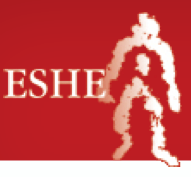European Society for the study of Human Evolution
|
Society logo | |
| Abbreviation | ESHE |
|---|---|
| Formation | 2011 |
| Legal status | Non-profit organisation |
| Purpose | Human evolution |
| Location |
|
Region served | Europe |
President | Jean-Jacques Hublin |
| Website | ESHE |
The European Society for the study of Human Evolution (abbreviated as ESHE) is a non-profit organization whose intention is to promote the fields of research which are involved in the investigation into the biological and cultural evolution of humans. This broad field of research comprises, among other disciplines, human paleontology or paleoanthropology, paleogenetics, paleolithic archaeology, and paleogeography.[1] The society was officially established in 2011 in Leipzig, Germany, as a non-profit organization under German law. The current president of the society is professor Dr. Jean-Jacques Hublin, Director of the Department of Human Evolution at the Max Planck Institute for Evolutionary Anthropology.[1]
The main goals of the society are to stimulate and facilitate communication and scientific collaboration between researchers and scientists involved in the study of human evolution, primarily through the organization of conferences, which are held annually in the second half of September. ESHE is dedicated to supporting activities which encourage new and innovative research in the field of human evolution, and is in particular supports the research of young scientists.[1]
Meetings
The inaugural ESHE meeting held was located in the societies headquarters, Leipzig, Germany. The meeting was the first annual, and was held September 23–24, 2011. In total, 61 posters and 62 podium presenters appeared, making the meeting a great success. That meeting was focused on abstracts of the presenters.[2]
The next meeting was located in Bordeaux, France. Many more posters were brought to this meeting, totaling 112, with only 60 presentations. The meeting was held September 21–22, 2012.[3]
Board members[1]
Board Officers:
- Jean-Jacques Hublin, President
- Wil Roebroeks, Vice President
- Thomas Terberger, Treasurer
- Marie Soressi, Secretary
- Fred Spoor, Adjunct Secretary
Regular Board Members:
- Anne Delagnes
- Sabine Gaudzinski
- Philipp Gunz
- Michelle Langley
- Shannon McPherron
- Paul O'Higgins
- Chris Stringer
- Gerhard Weber
References
- http://onlinelibrary.wiley.com/doi/10.1002/evan.21318/pdf
- http://onlinelibrary.wiley.com/doi/10.1002/evan.21344/pdf
